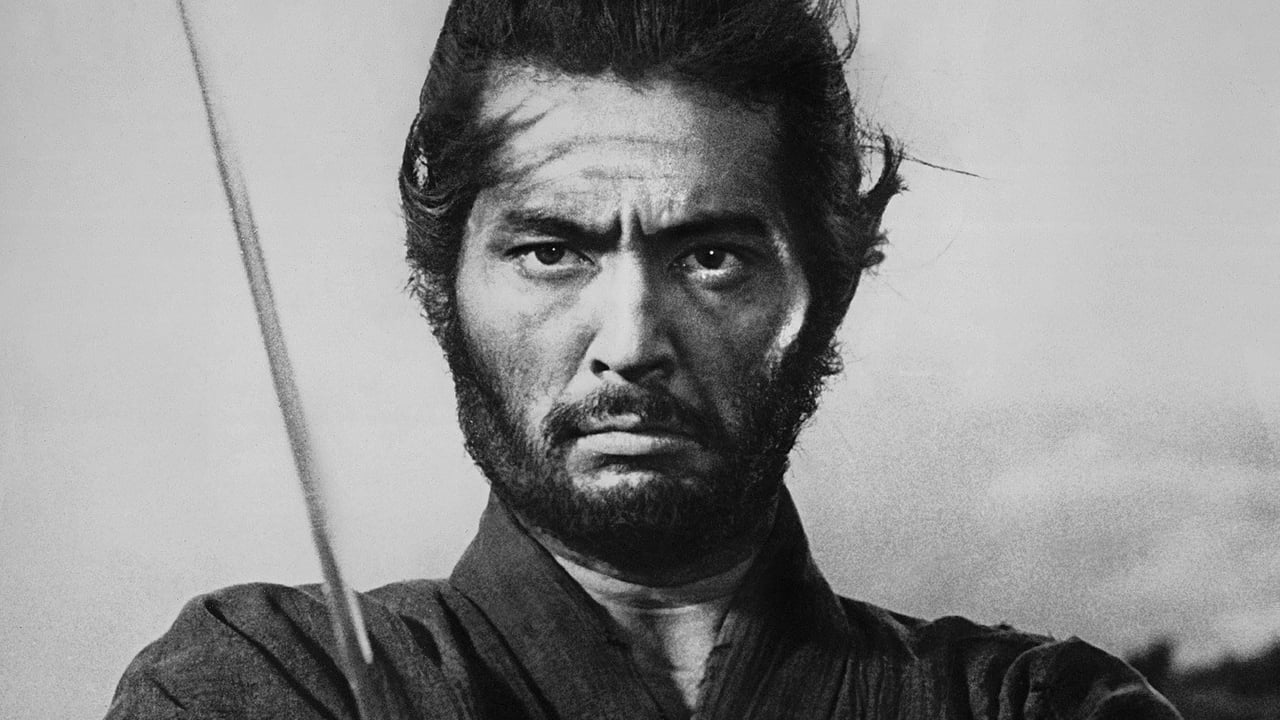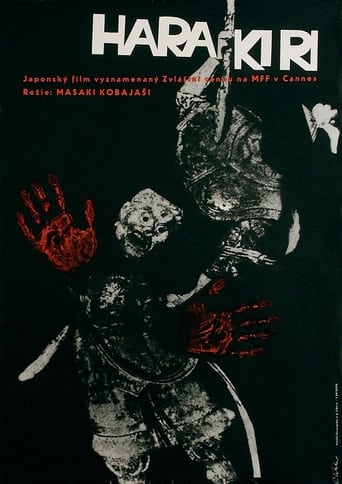PlatinumRead
Just so...so bad
Beystiman
It's fun, it's light, [but] it has a hard time when its tries to get heavy.
Bessie Smyth
Great story, amazing characters, superb action, enthralling cinematography. Yes, this is something I am glad I spent money on.
Wyatt
There's no way I can possibly love it entirely but I just think its ridiculously bad, but enjoyable at the same time.
cinemajesty
Film Review: "Harakiri" (1962)Running within competition at Cannes Film Festival in its 16th edition of year 1963, losing the "Palme d'Or" against a superior "Il Gattopardo" directed by Luchino Visconti (1906-1976), director Masaki Kobayashi (1916-1996) nevertheless receives eternal cinematic splendors due to perfectly-received samurai sword fighting confrontations in an open range, where every thrush breathes the ultimate hostility of one razor-sharp strike to the death.Based on a rarely known Japanese novel by author Yasuhiko Takiguchi (1924-2004), director Kobayashi indulges on black-and-white cinematographic splendors for slight moments too long in a 130-Minute-Editorial, which neverthless tends to amaze by its precision in visual compositions, when leading actor Tatsuya Nakadai elegantly restraints overacted beats to let "Harakiri" evolve to an hypnotic motion picture gem for the next generation to discover.Copyright 2018 Cinemajesty Entertainments LLC
Antonius Block
What is more dishonorable, out of work Samurai (Ronin) asking a clan to commit hara-kiri in their courtyard out of a desire to gain employment, with no intention of committing the act, or those in houses being cruel to them? When the country dishonors its Samurai, and they are driven to acts of desperation, leading to cruelty and further dishonor, the country spirals, and this movie set in 17th century seems to reflect decline in then present day (1962) Japan.The movie is quite beautiful visually, with traditional Japanese architecture and at one point a swaying bamboo forest framed beautifully by director Masaki Kobayashi. The story is taut and works on many levels, first and foremost as a vengeance with honor tale, which might remind you of an American Western, including a couple of epic battle scenes. It also has the individual man, disillusioned and saying that the Samurai code he lives by is a façade, and yet acting honorably, against a multitude misled by corrupt leaders. It's one against many in a battle that is timeless and certainly relevant today, and whose results are sadly akin to the entropy of the universe. "Who can know the depths of another man's heart?" the Samurai asks, signaling a need for empathy. Indeed.
popcorninhell
American ethos has always had a soft-spot for the conscientious objector. We're a nation of fervent individualists and everything from the writings of Mark Twain to the film 12 Angry Men (1957) codifies that idea. The power of an individual against a torrent of common corruption and blind group-think is almost fetishized, especially in contemporary society. The Japanese, generally speaking, don't have such a provocative streak of individualism embedded in their culture. So it's interesting that one of the most eloquent and austerely beautiful films on the subject should come from the land of the rising sun. Harakiri is a repudiation of the collective values of Japan that, on its best days unites a population in tragedy and at its worst marches a people towards war.Hanshiro Tsugumo (Nakadai) is an aging and embittered samurai whose feudal lord has died in battle along with most of his men. In order to reclaim his honor, according to the bushido code, Tsugumo must disembowel himself in a ritual suicide known as seppuku. To do this he arrives at the feet of Saito Kageyu (Mikuni) and asks members of the Iyi daimyo to help him do the ceremony correctly. Kageyu is hesitant as only a few days ago a similar request was made by another ronin who had no intention of committing seppuku but was looking to extort the clan for money. After Kageyu retells the man's tale, which culminates in the ronin dying by the blade of a bamboo sword, Tsugumo insists his intentions are to die with honor. Yet as the pavilion where the deed is to be done is setup, questions remain. What is Tsugumo's connection to the earlier ronin? Why did he pick the courtyard of the Iyi clan out of all others? Finally does he really intent to reclaim his honor, or is there something else going on?Told in a dizzying array of flashbacks and flash-forwards, Harakiri is not a leisurely movie to watch while folding laundry. It demands the attention of the viewer and weaves a complex tale of Hanshiro Tsugumo's home life after the fall of his clan. He's stricken with the most dire poverty, contemplating his daughter's (Iwashita) sale as a concubine and working menial jobs just to get by. His daughter, son-in-law Motome (Ishihama) and infant grandson Kingo are his only solace from a life of dishonor. Their fates become intimately intertwined with Tsugumo and the Iyi clan in unexpected ways and paying close attention to the plot pays off stunningly in the end.In his own quiet and ultimately unsettling way director Masaki Kobayashi strips away the nobility and romanticism commonly associated with feudal Japan. While doing so he implicates the modern audience (at the time the Japanese public circa 1962) in tolerating authoritarianism under the guise of honor. Harakiri recalls and parallels the days of Japanese imperialism and uses a single individual as a means to take apart the misplaced hubris of anyone still beholden to the old guard. Kobayashi himself was drafted in the army during WWII but repeatedly refused promotion beyond that of a private; his own way of fighting corruption, hypocrisy and evil.The film comes to a conclusion so damning and memorable that I dare not ruin the satisfaction of watching it for the first time. Harakiri is an absolute treasure featuring a star turn by Nakadai who first made an indelible mark on Japanese screens in Kobayashi's The Human Condition Trilogy (1959-1961). Here, while playing a character much older than himself, he still has a certain inner- turmoil that channels James Dean with a strong baritone. Finally there's Kobayashi's masterful direction which watches pensively and almost perversely as the jigsaw pieces fall in place.
souplipton
Harakiri is a must see film. A ronin's appearance bears much more significance than it seems at first glance. As his tale unfolds, the tension in the film can be felt as it grows and grows incredibly until it is nearly unbearable. When the tension breaks in the showdowns between our hero and the samurai of the house of Iyi, it is with a vitality that bursts from the screen. The ending is incredible, tying together all the themes in a bloodbath that offers no hope that this will not happen again. The selfish and cruel house of Iyi grows in stature and there seems to be no prospect of betterment for the honourable warriors. The film exposes the bushido code as a farse wherein the honourable are exploited by the selfish. Incredibly shot, written, acted, it is an astounding achievement by director Masaki Kobayashi. Go see it at your next opportunity.

